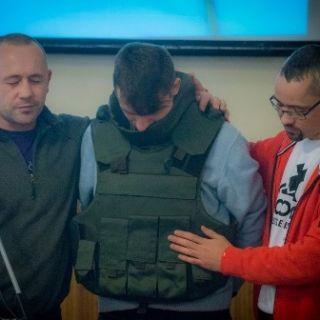
Stories of courage and faith
In the midst of war in Ukraine, Kiev Theological Seminary graduates continue to serve faithfully and fearlessly. Anatoly Prokopchuk, president of KTS, shares these examples of courageous service.
Since the seminary’s inception, our operation has been surrounded by complexities. But God’s mighty hand has led us faithfully along the way. Presently, we are learning to trust God in the midst of war, not just from books, but now from personal experience.
We welcome times of complexity. Such times provide nurturing soil for our personal faith and communal practice, allowing us to connect our studies of theology with daily living, which results in building the church of God in Ukraine and, we pray, globally.
Many of our students and alumni who lived in the conflict zone have been forced to relocate, leaving their homes, belongings, businesses, jobs, sometimes relatives and friends behind. They go to locations where peace abides. And yet other graduates leave peaceful locations and go where the need is greatest, even to the front lines.
A Displaced Church Plant
Oleg Larkov, a small business owner with a passion for God, had planted a church in Bryanka, a city in eastern Ukraine. While leading the church, he felt the need to deepen his understanding of the Bible and develop his skills for effective ministry. So he came to study at KTS’ church planting program and graduated in 2009.
He and his family had to flee the war zone, leaving behind their home, his small business and ministry. They hoped to return to their city soon but it became clear that such move was not possible until peace is settled there.
What did he do being uprooted from his home? Oleg prayed and formed a new church planting team, including other KTS graduates, students and faculty. His team planted a new church in Kyiv reaching out to families displaced by the war. They named this new church God’s Design Church, expressing their faith in God’s sovereign reign over their lives.
Cross-country Help
Vyacheslav Nedzelsky graduated this year with a degree in pastoral leadership. He serves as the Pastor of a Baptist church in Khust, a small town located on the western border of Ukraine.
He was deeply moved by the story of a wounded Ukrainian serviceman who died due to lack of timely transportation to the hospital. He shared his vision of meeting this need with the church. Members of his church raised money to buy a vehicle for Ukrainian servicemen in the east.
They deployed the vehicle to the front lines along with 500 pocket-size New Testaments. Vyacheslav said, “We send this vehicle to protect their bodies, and we also send the Scriptures to protect their souls.”
A Chaplain on the Front Lines
Maksim Gusev, a KTS graduate from Sumy, a city in northern Ukraine, sensed an urgency to minister to servicemen on the front line as a chaplain, right when the conflict erupted in eastern Ukraine.
He spent months privately seeking God’s will. He asked his wife to pray and they sought God’s will together as a family. Gaining confidence in God’s calling to minister as a chaplain he filed an application for the service.
He shared his experience of being a chaplain during chapel at KTS last February. When he finished, he was surprised with a needed gift, a bulletproof vest, purchased with money raised by a local church and the KTS community. We committed him to the Lord in prayer (picture above).
Relevant Training
Our school has also held a conference for chaplains to provide much-needed training on Post Traumatic Stress and how to minister to families of servicemen who have been directly affected by the war.
I am grateful to see our school continuing to fulfill our vision to be an international center of relevant training and instructive resources for Christians in ministry.
I want to conclude with the words of Joseph, whose life story is a wonderful reminder of God’s redeeming work in history, “God meant it for good.”
Thank you for keeping us in prayers.
Additional Posts




